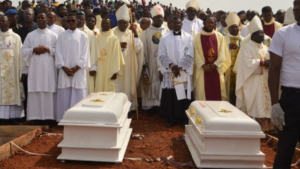Ukraine gains ground, celebrates counterattack ‘success’
Russian forces lost territory on all fronts during the 28th week of war, as a counteroffensive spread from the southern Kherson region to the eastern and northern fronts of the country, demonstrating Ukraine’s ongoing ability to seize the initiative.
North Ukrainian forces launched a new counterattack in the northern Kharkiv region on September 6.
Despite radio silence from the country’s political and military leadership in Kyiv, Ukrainian and Russian military bloggers reported heavy fighting in Verbivka and Balakliia, 70km (44 miles) southeast of Kharkiv city, which Ukraine recaptured in early May.
Ukrainian forces appeared to have reclaimed Verbivka, where they posted geolocated footage showing dead Russian soldiers.
Rybar was one of several Russian military bloggers reporting continuing fighting around Balakliia on the evening of September 6, but early on September 7, reported that the town had been completely surrounded.
“[Balakliia] is in the operational encirclement and in the range of fire of Ukrainian artillery. All entrances are cut off by [enemy] fire,” he wrote.
Russian reporters also said that Moscow’s forces had blown up bridges across the Balakleyka and Krainya Balakleyka rivers to prevent Ukrainians from advancing further.
Unconfirmed reports said the attack triggered a collapse of the Russian front, which was weakened last month to redeploy forces to the south.
The offensive appears to have resulted in a bloodbath for the Russian military.
Ukraine reported 460 enemy fatalities, an extraordinary toll for one day.
The offensive came a day after Ukrainian forces destroyed a Russian ammunition depot in Balakliia, in a repeat of the tactics of corrosion used in the south.
East Ukrainian troops maintained pressure in the Donetsk region, recapturing Ozerne on September 4, thus gaining a foothold on the occupied northern shore of the Siversky Donets River.
Ukrainian News24 and MilitaryLand posted footage showing the servicemen crossing the Siversky Donets River home after completing the mission, and geolocated photographs confirmed their success.
Ukrainian troops maintained the eastern offensive on September 6. Denis Pushilin, head of the self-proclaimed Donetsk People’s Republic, said Russian forces were defending Kodema in Donetsk.
In typical fashion, Russia officially dismissed the Ukrainian counteroffensive as a failure, saying it had inflicted heavy casualties.
But new research suggests that such Kremlin narratives may be losing potency.
Maxim Alyukov, a postdoctoral fellow at King’s Russia Institute, led a quantitative study of Russian television and social media coverage of the war to find that the number of television stories on Ukraine has decreased by half compared with February and March.
Russian TV managers are reintroducing shows that had been cancelled to make time for war propaganda.
Alyukov told Al Jazeera, “It’s back to normal – back to a pre-war style of reporting, with a balance of propaganda and entertainment … because if you lose [viewers], you lose control of them.”
Alyukov also found that mention of a key Russian justification for the war – “de-Nazifying” Ukraine – has decreased by a factor of six on TV.
“They almost abandoned this idea,” he said.
“[The Kremlin] used four very specific ideas to justify the invasion: de-Nazification, demilitarisation, protecting the Donbas population and NATO expansion,” Alyukov said.
“They all fit into the general idea of fighting the West and restoring Russia’s greatness … but the idea of de-Nazification is something people struggle to comprehend.”
Russian President Vladimir Putin’s grip on social media is slipping even more. Despite being outlawed as a term for Russia’s invasion of Ukraine, the word “war” is used on social media almost four times more often than on TV, including by government supporters, Alyukov found.
It may not help Putin that propagandists have committed obvious blunders.
Ukraine’s defence ministry said Russia claimed to have destroyed Leopard 2 tanks and Bradley fighting vehicles, equipment Ukraine has not yet received.
But the Russian leadership has insisted on its tactics. Speaking to young diplomats on September 1, Russian foreign minister Sergey Lavrov said it was the West that unleashed the war on Russia “shamelessly, openly, rudely and aggressively”.
As for Putin, he committed 50,000 troops, 60 warships and 140 aircraft to the Vostok 2022 war games with China, possibly to belie reports that he is running short of weapons and men.
A US intelligence report revealed he is buying millions of artillery shells from North Korea, suggesting that sanctions may be already causing supply chain problems.
According to Ukraine’s defence ministry, Russia has lost more than 50,000 men, 2,097 tanks, 4,520 armoured personnel vehicles, 1,194 artillery systems and 445 planes and helicopters.





